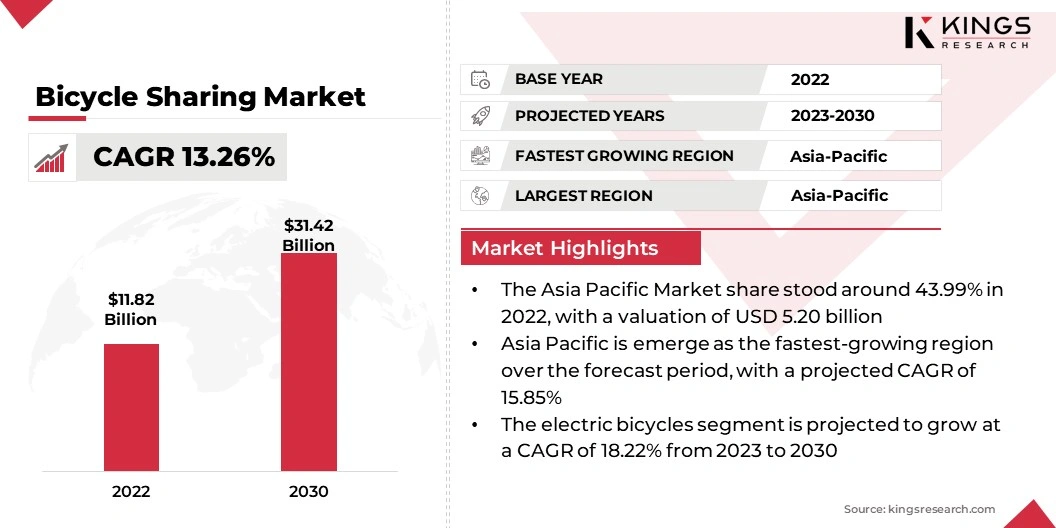Consumer Goods

Bicycle Sharing Market

Bicycle Sharing Market Size, Share, Growth & Industry Analysis, By Type (Traditional Bicycles, Electric Bicycles), By Sharing System (Dock-Based, Free-Floating, Hybrid) and Regional Analysis, 2023-2030
Pages : 120
Base Year : 2022
Release : February 2024
Report ID: KR464
Bicycle Sharing Market Size
The global Bicycle Sharing Market size was valued at USD 11.82 billion in 2022 and is projected to reach USD 31.42 billion by 2030, growing at a CAGR of 13.26% from 2023 to 2030. In the scope of work, the report includes solutions offered by companies such as Mobike, Lime, ofo, JUMP Bikes, Bird, Citi Bike, oBike, Bluegogo, Zagster, Spin, and Others.
The bicycle sharing market is experiencing a surge in optimism due to the rising global trend of urbanization. As cities become increasingly crowded and traffic congestion worsens, there is a growing demand for sustainable and efficient transportation solutions. This trend has brought bicycle sharing to the forefront as a popular option. The flexibility and eco-friendly nature of bicycle sharing systems make them an ideal solution for urban dwellers seeking alternatives to traditional transportation methods.
Furthermore, as local governments prioritize green mobility and invest in cycling infrastructure, the bicycle sharing market stands to gain substantial benefits. The growing urban population, combined with the environmentally conscious mindset driving bicycle sharing, positions the bicycle sharing market at the forefront of the evolving landscape of urban mobility.
Analyst’s Review
The bicycle sharing market is set to undergo a transformative shift from 2023 to 2030, driven by several factors such as technological advancements, changing consumer preferences, and proactive government initiatives. One significant trend is the increasing integration of electric bicycles into the market. As battery technology improves, electric bicycles are becoming more affordable and efficient, appealing to a wider range of consumers.
Furthermore, smart technology adoption is expected to surge in the market, driven by features such as GPS tracking, mobile apps, and IoT sensors, thereby enhancing the user experience and operational efficiency. This trend aligns with the broader evolution towards smart cities, where bicycle sharing systems are seamlessly integrated into comprehensive urban mobility solutions.
Collaborations and partnerships are likely to play a crucial role in driving market growth. Bicycle sharing operators are likely to form alliances with local governments, businesses, and technology firms to create well-integrated mobility networks. Additionally, governments worldwide are expected to increase their support for cycling infrastructure, fostering sustainability and further propelling market growth.
From 2023 to 2030, the bicycle sharing market is projected to expand its user base and become an integral part of futuristic urban landscapes. It is likely to cater to the evolving needs of environmentally conscious and tech-savvy commuters, solidifying its position as a vital component of modern transportation systems.
Market Definition
Bicycle sharing, also known as a bike share program or public bicycle scheme, offers individuals affordable access to bicycles as a shared transport service. There are two main types of bicycle sharing systems: dock-based and free floating. Dock-based systems involve renting a bike from a technology-enabled rack and returning it to another designated rack within the system. Free floating systems, on the other hand, operate without fixed racks and rely on smart technology for bike location and rental transactions.
To locate available bikes and docks, users often rely on smartphone web mapping services. It's important to note that regulations in the bicycle sharing market can vary across jurisdictions. These regulations cover aspects such as safety standards, parking guidelines, and operational protocols. Governments and local authorities play a crucial role in shaping these regulations to ensure the smooth integration of bicycle sharing into urban transportation systems.
These regulations aim to ensure user safety, encourage responsible use of shared resources, and promote the sustainability of bicycle-sharing systems. They reflect the changing dynamics of urban mobility and the need to provide efficient and eco-friendly transportation alternatives.
Bicycle Sharing Market Dynamics
Technological advancements play a crucial role in driving the bicycle sharing industry, enhancing the user experience and system efficiency. The integration of cutting-edge technologies, such as GPS tracking, mobile apps, and IoT sensors, revolutionizes the way bicycle sharing operates. GPS tracking ensures accurate bike locations, making it easy for users to find and access bicycles through mobile applications. These apps further provide real-time information on bike availability and nearby docking stations, making the process more convenient for users. Moreover, IoT sensors contribute to operational efficiency by facilitating better fleet management and maintenance. These sensors enable operators to monitor the condition of the bikes, track usage patterns, and proactively address maintenance needs.
Safety concerns present a significant restraint in the bicycle sharing market, as potential users may have worries about accidents and theft. The vulnerability of cyclists to road incidents and the risk of bike theft can undermine the perceived safety of bicycle sharing systems, discouraging people from using this mode of transportation. Insufficient cycling infrastructure, along with the presence of motorized traffic, exacerbates safety concerns.
The growing focus on smart city initiatives presents a promising opportunity for integrating bicycle sharing systems into comprehensive urban mobility solutions. As cities worldwide strive to become smarter and more connected, the alignment between smart city initiatives and bicycle sharing becomes evident. Incorporating bicycle sharing into these initiatives brings several benefits. It enhances connectivity, promotes sustainable transportation, and contributes to the overall aim of reducing traffic congestion. By seamlessly integrating with broader urban mobility frameworks, bicycle sharing supports the principles of smart cities and becomes a crucial element in creating a more efficient, environmentally friendly, and interconnected urban transportation system.
Educating and encouraging users to adopt bicycle sharing services present a significant challenge, especially in regions where cycling is not widely used for transportation. To promote a change in consumer behavior, it is essential to implement a strong educational initiative that highlights the various benefits and safety aspects of these services. Many potential users may not be familiar with the convenience, cost-effectiveness, and environmental advantages offered by bicycle sharing systems. Additionally, addressing safety concerns and promoting responsible cycling practices are crucial aspects of this challenge. Operators, working together with local governments, should conduct comprehensive awareness campaigns to overcome ingrained habits and skepticism and foster a better understanding of how bicycle sharing positively impacts personal mobility, urban congestion, and environmental sustainability.
Segmentation Analysis
The global bicycle sharing market is segmented based on type, sharing system, and geography.
By Type
Based on type, the market is segmented into traditional bicycles, and electric bicycles. The electric bicycles segment is projected to experience strong growth, with an impressive CAGR of 18.22% from 2023 to 2030. This substantial growth is likely to be driven by the growing consumer demand for electric bicycles, which is expected to be fueled by advancements in battery technology, increased environmental awareness, and a preference for efficient and sustainable urban mobility solutions. As electric bicycles continue to become more accessible and attractive, their increasing popularity in the market is estimated to reflect a significant shift towards greener and technology-driven transportation options.
By Sharing System
Based on sharing system, the market is classified into dock-based, free-floating, and hybrid. In 2022, the dock-based segment led the bicycle sharing market, capturing an impressive market share of 62.26% and generating USD 7.36 billion in revenue. This dominance highlights the enduring popularity and reliability of dock-based systems, where users rent bicycles from designated docks. The substantial revenue in this segment indicates the continued preference for structured, station-based models that emphasize the convenience and organized nature of dock-based bicycle sharing. While other models such as free floating and hybrid systems may offer flexibility, the strong performance of the dock-based sharing system demonstrates its resilience and market stronghold, showcasing a well-established and thriving aspect of the bicycle sharing ecosystem.
Bicycle Sharing Market Regional Analysis
Based on region, the global bicycle sharing market is classified into North America, Europe, Asia-Pacific, MEA, and Latin America.

The Asia Pacific Bicycle Sharing Market share stood around 43.99% in 2022 in the global market, with a valuation of USD 5.20 billion. The region experienced rapid urbanization, especially in densely populated countries such as China and Japan, which has propelled the demand for sustainable and cost-effective urban mobility solutions. Government initiatives promoting eco-friendly transportation and substantial investments in cycling infrastructure further boosted the adoption of bicycle sharing systems in the region. Moreover, the cultural acceptance of cycling as a mode of transportation and increasing awareness of environmental issues have played important roles in driving regional market growth. Asia Pacific is expected to maintain its dominance and emerge as the fastest-growing region over the forecast period, with a projected CAGR of 15.85%.
Competitive Landscape
The global bicycle sharing market study will provide valuable insight with an emphasis on the fragmented nature of the industry. Prominent players are focusing on several key business strategies such as partnerships, mergers and acquisitions, product innovations, and joint ventures to expand their product portfolio and increase their market shares across different regions. Expansion & investments involve a range of strategic initiatives including, investments in R&D activities, the establishment of new manufacturing facilities, and supply chain optimization, which could pose new opportunities for market growth.
List of Key Companies in Bicycle Sharing Market
- Mobike
- Lime
- ofo
- JUMP Bikes
- Bird
- Citi Bike
- oBike
- Bluegogo
- Zagster
- Spin
Key Industry Developments
- October 2023 (Service Launch): The Metropolitan Transit Authority of Harris County, Houston announced plans to introduce a shared electric bike program, enhancing sustainable transportation in the city. The initiative aimed to provide residents with convenient and eco-friendly commuting options, contributing to Houston's broader efforts in promoting green mobility. The shared e-bike program is anticipated to address urban mobility challenges and align with the city's commitment to fostering environmentally conscious transportation solutions.
- June 2023 (Collaboration): The City of Santa Cruz officially launched a bike-sharing program in collaboration with B-cycle. The initiative aimed to enhance local transportation options, promoting eco-friendly commuting and reducing traffic congestion. The bike-sharing program provides residents with convenient access to bicycles, contributing to the city's sustainability goals and encouraging healthier and more sustainable modes of transportation. The partnership with B-cycle indicates a concerted effort by the City of Santa Cruz to integrate bike-sharing as part of its urban mobility strategy.
The Global Bicycle Sharing Market is Segmented as:
By Type
- Traditional Bicycles
- Electric Bicycles
By Sharing System
- Dock-Based
- Free-Floating
- Hybrid
By Region
- North America
- U.S.
- Canada
- Mexico
- Europe
- France
- U.K.
- Spain
- Germany
- Italy
- Russia
- Rest of Europe
- Asia-Pacific
- China
- Japan
- India
- South Korea
- Rest of Asia-Pacific
- Middle East & Africa
- GCC
- North Africa
- South Africa
- Rest of Middle East & Africa
- Latin America
- Brazil
- Argentina
- Rest of Latin America.
CHOOSE LICENCE TYPE
Frequently Asked Questions (FAQ's)
Get the latest!
Get actionable strategies to empower your business and market domination
- Deliver Revenue Impact
- Demand Supply Patterns
- Market Estimation
- Real-Time Insights
- Market Intelligence
- Lucrative Growth Opportunities
- Micro & Macro Economic Factors
- Futuristic Market Solutions
- Revenue-Driven Results
- Innovative Thought Leadership

.webp)